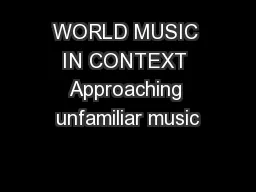PDF-Globalizing musical identities remarks on the semiotics of music
Author : cheryl-pisano | Published Date : 2014-09-30
573765742857448574455745857445573765744157458574455737657455574545745257465573765746057448574455737657441574435745557461574595746057449574435744157452573765746157454574495746257445574585745957441574525745957376574555744657376574605744857445573765745
Presentation Embed Code
Download Presentation
Download Presentation The PPT/PDF document " Globalizing musical identities remarks ..." is the property of its rightful owner. Permission is granted to download and print the materials on this website for personal, non-commercial use only, and to display it on your personal computer provided you do not modify the materials and that you retain all copyright notices contained in the materials. By downloading content from our website, you accept the terms of this agreement.
Globalizing musical identities remarks on the semiotics of music: Transcript
Download Rules Of Document
" Globalizing musical identities remarks on the semiotics of music"The content belongs to its owner. You may download and print it for personal use, without modification, and keep all copyright notices. By downloading, you agree to these terms.
Related Documents














